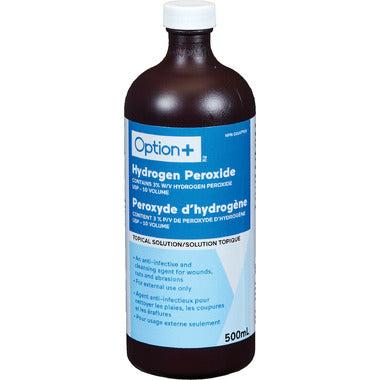1
/
of
1
Option+
Option+ Hydrogen Peroxide 3%
Option+ Hydrogen Peroxide 3%
Regular price
$4.00 CAD
Regular price
Sale price
$4.00 CAD
Shipping calculated at checkout.
Quantity
Couldn't load pickup availability
Option+ Hydrogen Peroxide 3% is a topical antiseptic solution intended for external use on minor wounds and disinfection purposes. Here's a breakdown of its potential benefits and how to use it safely:
Active Ingredient:
- Hydrogen Peroxide 3% (w/v): This is a diluted solution commonly used as a topical antiseptic and disinfectant.
Benefits:
- Disinfection: Can help kill bacteria and some viruses on the skin and surfaces. It's useful for cleaning minor cuts, scrapes, and abrasions before applying a bandage.
- Debridement (removal of dead tissue): The fizzing action of hydrogen peroxide can help loosen and remove dead skin or debris from minor wounds, aiding in the cleaning process.
How to Use:
- Clean and dry the affected area thoroughly.
- Apply a small amount of hydrogen peroxide to the wound using a sterile gauze pad or cotton swab.
- Allow it to fizz and bubble, then gently blot the area with a clean gauze pad.
- Avoid applying directly to open wounds as it can cause stinging or irritation.
- Do not use excessively, as it can dry out the skin around the wound.
Things to Consider:
- Not a substitute for wound closure: Hydrogen peroxide cleans and disinfects but doesn't close wounds. Proper wound closure with bandages or stitches might be necessary depending on the severity of the wound.
- Limited effectiveness: Hydrogen peroxide's effectiveness as an antiseptic is somewhat limited compared to other options.
- Short-lived action: Its antiseptic effect fizzles out quickly, so it's not suitable for long-term wound disinfection.
- Not for deep wounds: It is not recommended for deep wounds, puncture wounds, or burns.
- Stinging sensation: Applying directly to open wounds can cause a stinging sensation.
Alternatives:
- Isopropyl Alcohol: Another option for topical disinfection, though it can also be drying.
- Antiseptic Solutions: Various antiseptic solutions might be more effective for wound care, depending on the doctor's recommendation.
- Soap and Water: Thorough cleaning with soap and water is often sufficient for minor wounds that don't require a strong antiseptic.
Disclaimer:
This information is intended for educational purposes only and is not a substitute for medical advice. Always consult with a doctor for proper diagnosis and treatment of any wounds or skin conditions. They can advise you on the most suitable approach for wound care and recommend the best antiseptic solution for your needs.
Share


